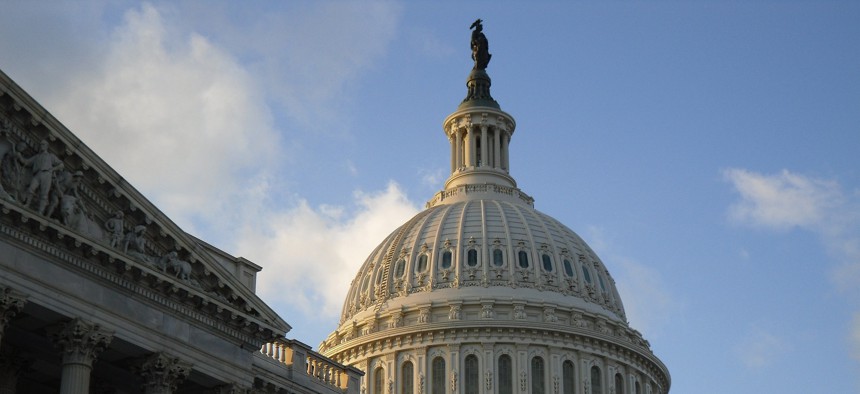Policy
Republicans tell Biden: Outsource more federal jobs
As the feds lag, however, Florida has led the way in privatization, starting in earnest under Jeb Bush.

Image by Wenhan Cheng from Pixabay
House Republicans are asking the Biden administration for additional information on whether federal agencies can outsource more of their work, saying an existing process can help reduce spending.
Any function that is not “inherently governmental” can be competed with the private sector to determine who can perform it more efficiently, Reps. Nancy Mace, R-S.C., Lisa McClain, R-Mich., and Pete Sessions, R-Texas, all leaders of various House Oversight and Accountability subcommittees, reminded Office of Management and Budget Director Shalanda Young in a recent letter.
They accused the Biden administration of failing to compile the annual lists of non-inherently governmental activities from each agency, as is required under the 1998 Federal Activities Inventory Reform (FAIR) Act. When agencies have posted those inventories, the lawmakers said, they are done in formats that are “barely decipherable.”
“At a time of surging annual deficits, the administration should be using all cost-saving tools at its disposal—including outsourcing functions that can be performed more efficiently by the private sector,” the subcommittee chairs said. OMB did not immediately respond to a request for comment.
To compare, for the better part of the 21st century, Florida state government has been on a privatization kick. The seeds were planted in 1989 by then-Gov. Bob Martinez, a Republican, who "justified denying state workers a pay increase in the coming fiscal year, saying there were too many 'lard bricks' on the payroll," as UPI reported then.
It continued under his Democratic successor Lawton Chiles, but it was GOP former Gov. Jeb Bush, in office 1999-2007, who championed privatization, including for example a deal with Convergys to takeover state human-resources functions. He went on to pursue prison privatization as well.
There were failures: His "experience outsourcing veterans’ nursing homes in Florida was a case study in privatization’s pitfalls," CNN reported. "By the time it was over, Florida officials determined the state could provide higher-quality care at a better price for taxpayers.
Still, in a now famous line from his second inaugural address, Bush said he wanted to empty state office buildings of all their workers, turning them into "silent monuments to the time when government played a larger role than it deserved or could adequately fill.”
Outsourcing plays into domestic spending cuts
Republican House leadership is currently in a standoff with President Biden as it has demanded dramatic domestic spending cuts in order to raise the debt ceiling. The House majority has suggested fiscal 2024 discretionary spending at non-defense agencies be reduced by as much as 25%. In their letter, the lawmakers lamented that Biden’s fiscal 2024 budget would grow the federal workforce by nearly 11% from fiscal 2022 levels.
The FAIR Act reports are necessary for “sound federal financial stewardship,” they said, requesting OMB work with them to ensure full compliance with the law. The lawmakers requested the number of federal employees that are currently performing non-inherently governmental functions, broken down by agency.
They also asked for a list of the agencies that are delinquent on compiling the information and specifics on how OMB uses the data that agencies do report to make decisions on outsourcing.
The insourcing-outsourcing dynamic revolves around the noted Office of Management and Budget Circular A-76, issued in 1966. Continually updated, A-76 requires agencies to compete with private-sector firms for the opportunity to perform types of work that the agencies have decided is not inherently governmental in nature.
The George W. Bush administration sought to expand the use of A-76 “conversions” to outsource more work, but ran into resistance from employee groups and Congress, forcing it to scale back the efforts during Bush’s second term. The Obama administration in turn banned most outsourcing and pulled more functions back to the agencies.
In September 2011, the Office of Federal Procurement Policy sought to clarify what qualifies as an “inherently governmental” function that must be performed in-house, calling the guidance a “milestone” in implementing President Obama’s 2009 directive on reducing contractor waste.
Federal employee advocates have long argued outsourcing always winds up being more expensive and the A-76 process fails to make apples-to-apples comparisons. The last several annual funding bills, including the fiscal 2023 omnibus, have included prohibitions on using the A-76 process or any other effort to study public-private competitions.
Jim Rosica contributed. A version of this story was first published on Government Executive.
NEXT STORY: Crime data doesn’t back up claims of 'dangerous' downtown Tallahassee
